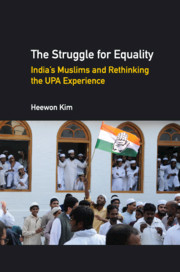Book contents
- Frontmatter
- Dedication
- Contents
- List of Tables and Figures
- List of Abbreviations
- Acknowledgements
- Introduction
- 1 Opening Up the ‘Black Box’ of Public Policy: Towards an Institutional Analysis of India's Policies on Religious Minorities
- 2 Constitution-Making, Equality of Opportunity and Religious Minorities: Reassessing the Critical Juncture
- 3 The UPA in Power: The New Equal Opportunities Framework, Religious Minorities and the Limits of Change
- 4 UPA, Muslims and Public Sector Employment: Assessing the Record
- 5 UPA, Muslims and Service Delivery
- 6 UPA, Muslims and the Communal Violence Bill
- Conclusion
- Appendix Recruitment of minorities in central government departments and public sector undertakings
- Bibliography
- Index
6 - UPA, Muslims and the Communal Violence Bill
Published online by Cambridge University Press: 12 February 2019
- Frontmatter
- Dedication
- Contents
- List of Tables and Figures
- List of Abbreviations
- Acknowledgements
- Introduction
- 1 Opening Up the ‘Black Box’ of Public Policy: Towards an Institutional Analysis of India's Policies on Religious Minorities
- 2 Constitution-Making, Equality of Opportunity and Religious Minorities: Reassessing the Critical Juncture
- 3 The UPA in Power: The New Equal Opportunities Framework, Religious Minorities and the Limits of Change
- 4 UPA, Muslims and Public Sector Employment: Assessing the Record
- 5 UPA, Muslims and Service Delivery
- 6 UPA, Muslims and the Communal Violence Bill
- Conclusion
- Appendix Recruitment of minorities in central government departments and public sector undertakings
- Bibliography
- Index
Summary
Introduction
Equal protection under the law for racial, ethnic, religious and other minorities is considered a fundamental right, and in the 1980s and 1990s, Western democracies increasingly adopted legislation that outlawed specific forms of hate crime targeted at minorities (Addison 2007; Jacobs and Potter 1998). In India, special legislative provisions for vulnerable groups, such as the antidiscrimination measures in the Protection of Civil Rights Act (1955) and the Scheduled Castes and Scheduled Tribes (Prevention of Atrocities) Act (1989), have provided strong legal protection and security to caste groups in the wake of violence. In contrast, though religious minorities, especially Muslims, have been the target of violence during communal riots, they and other religious minorities lack equivalent protection. Hindu–Muslim riots and anti-Muslim pogroms have become the defining feature of post-1947 collective violence in India, and the regular recurrence of such events presents a serious challenge to the principles of secularism and religious tolerance. Recognising this fact, the UPA government promised to ‘enact a model comprehensive law to deal with communal violence’ (Government of India 2004).
In this chapter we undertake a detailed case study of the UPA's efforts to legislate for a model anti-communal violence bill by focusing on draft bills produced in 2005 and 2011 and the policy process thereafter. We highlight how the UPA's efforts to produce ‘top-down’ legislation were frustrated by the institutionalised opposition to such a measure—political, administrative and judicial—and how Muslim communities and civil society networks sought to build momentum for the bill. The goal of a new, normative legislation that could have significantly increased the penalties for committing communal violence, however, continued to elude the UPA. Faced with opposition within its own ranks, the Congress-led UPA eventually opted for symbolic implementation.
Agenda-setting
After 2004, the UPA government was determined to prevent Gujarat-type anti-minority massacres. Historically, in the aftermath of violence, state and central governments have usually taken action, some stronger than others, to deal with riots. State government and police have often been partisan in controlling violence, managing post-conflict situations, and providing relief and rehabilitation (Gonsalves 2002; Gupta 2011; Wilkinson 2004).
- Type
- Chapter
- Information
- The Struggle for EqualityIndia's Muslims and Rethinking the UPA Experience, pp. 171 - 194Publisher: Cambridge University PressPrint publication year: 2019



